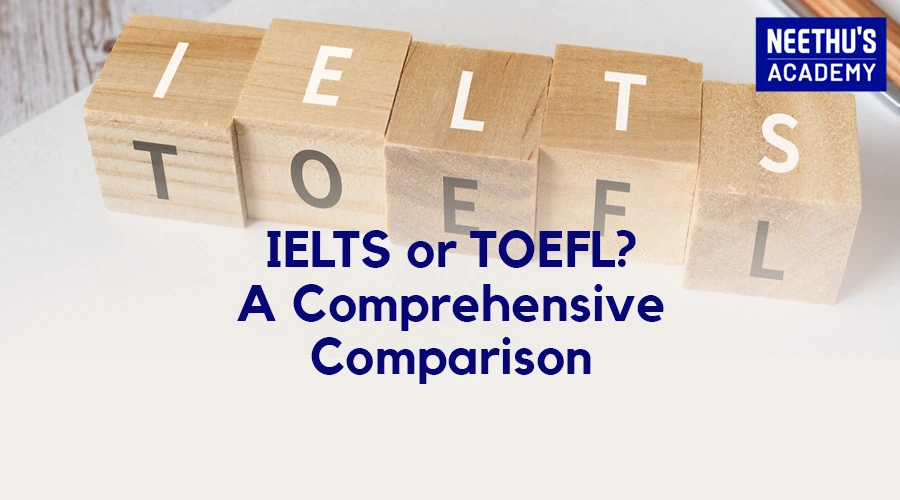TOEFL vs IELTS: The Ultimate Showdown for English Proficiency
Proving one’s ability in the English language is a prerequisite for employment, education, or immigration to English-speaking countries in the globalized world. Among the most widely used standardized English language tests are TOEFL (Test of English as a Foreign Language) and IELTS (International English Language Testing System). Both tests are approved worldwide by colleges, immigration services, and companies. It is tough to select between the two because they have different formats yet serve the same purposes. There are a few things to consider when deciding between TOEFL and IELTS. One test may be more appropriate than the other depending on your objectives, whether they are academic, immigration, or professional licensing-related.
This comprehensive comparison of TOEFL and IELTS will reveal to you the key differences between these two tests, which one is easier to take and more suitable for certain situations. We have answers to all your questions such as how TOEFL and IELTS differ, which exam is easy to take or which of them proves to be better for immigration purposes.
Overview of IELTS and TOEFL
IELTS
The IELTS exam is one of the most recognized English language competency exams around the world. It is owned by the British Council, IDP: IELTS Australia, and Cambridge Assessment English. Its result is widely accepted by employers, academic institutions, and immigration agencies all over Europe, including in the UK, Canada, Australia, and New Zealand.
The IELTS test is offered in two variations:
IELTS Academic: For all candidates applying for entry into graduate school or professional registration in an English-speaking country.
IELTS General Training: It is designed for people going to English-speaking countries for secondary education, work, or vocational training.
In both versions, the four language skills; speaking, reading, writing, and listening will be tested. The speaking test is a live test that involves an examiner.
TOEFL
Another well-accepted test for the English language is the TOEFL, which is mainly targeted at students wishing to attend English-speaking colleges, especially those in North America. It is widely known to the academic institutions of the United States, Canada, and other European and Asian nations. It is administered by the ETS (Educational Testing Service).
The TOEFL measures the reading, listening, speaking, and writing skills of non-native speakers who expect to use the English language for study or work purposes. The IELTS is entirely computer-based in contrast to the TOEFL, even about the speaking part because answers are recorded and evaluated later by the examiners.
Differences in Test Structure and Content
Test Format
IELTS: The IELTS is administered on the computer or paper according to the facility for testing. The speaking test is in-person and overseen by a qualified examiner. There exist two versions of the test. Each is designed differently for unique needs. These are IELTS Academic and IELTS General Training.
TOEFL: The test is computer-delivered online, including the speaking section. Examiners listen to audio recordings of the test-taker’s responses to the listening questions. This is done after the actual test, when they report on the test-taker’s audio work.
Question Types
IELTS: There are a variety of question types in the IELTS, including multiple-choice, matching, sentence completion, true/false/not given, short-answer, and essay writing. You will take a speaking test with an examiner one-on-one.
TOEFL: Most of the questions in the test are multiple-choice. The writing section is composed of assignment responses, which occur through the composition of short essays. The speaking section is completed by following prompts about familiar topics or brief readings to answer questions via a microphone.
Scoring Systems
IELTS: The total score for each section is decided using a band of 0 to 9. Combining the scores, an average will be generated for each of these four sections. In the end, the outcome is rounded off or down to the next nearest 0.5 band. For your eventual score, you will be rounded to the nearest whole number. That might mean that if your overall average score in all sections is 6.25, your eventual score is going to round up to 6.
TOEFL: It’s a test consisting of 120 points. Each of its four independent sections yields up to 30 points. The sum of each of the scores for these different sections is the total score.
Which Test is Easier?
The easier test is subjective, depending on what kind of test you would prefer and what kind of strengths you have.
IELTS: Since the speaking part of the test is taken orally, that too face-to-face with a real person, most of the test-takers feel it is easier. Speaking with a real person, rather than speaking into a microphone, is sometimes better. Moreover, IELTS questions are more understandable and are spread over a bigger amount of English proficiency so candidates who are more fluent in conversational English find it relatively easy.
TOEFL: This test may be suitable for candidates who are accustomed to academic English and like multiple-choice questions. Some people do not like the speaking portion of the TOEFL because one has to respond to a microphone and not to a real person whom one can converse with. For experienced people who write many academic essays, the writing part might seem easy.
TOEFL vs IELTS: Which is Easier?
There is no right or wrong answer since it all depends on how comfortable you feel about the different test formats. Some students find IELTS easier because of face-to-face engagement in the speaking portion, but others find the computerized format of the TOEFL more convenient and practical.
Which Test is Better for You?
The decision between IELTS and TOEFL is based on your individual objectives, including academic, career, or immigration-related. Let’s investigate which test would be more appropriate for you.
For Academic Purposes
- US and Canadian universities have high approval ratings for the TOEFL, which often is the test of choice there. Because TOEFL tests English used in academic settings, students already enrolled in North American universities may find this test better suited to their purposes.
- Whereas, universities in UK, Australia, New Zealand, and Europe tend to accept IELTS. If it is merely a study that one is looking for in these areas, IELTS can then become a better option.
For Immigration
In many countries, including the UK, Australia, New Zealand, and Canada, IELTS is the number one English proficiency testing choice for emigration. Immigration departments very often use the IELTS General Training test results during visa application and permanent residency procedures.
TOEFL score reports are usually accepted by some nations, but only for certain categories of visas. The test is less likely to be used for immigration processes compared to IELTS.
For Professional Licensing
Professional licensure in various professions like health, engineering, and education across countries like Canada, the UK, and Australia often requires the IELTS exam to be accomplished. Among the test options, IELTS is one popular test among students requiring certification due to the fact that it is widely accepted by professional boards and organizations.
The TOEFL is recognized by some professional organizations; however, IELTS is the first choice for licensure outside of North America.
Cost and Availability
There is ample provision of both IELTS and TOEFL tests, although the actual cost may differ depending on your region.
IELTS: The fee to sit for the IELTS exam is usually between $215 to $250, depending upon the country and the location of the test venue.
TOEFL: Depending on the country, the fee charged for the TOEFL test lies somewhere between $180 to $250.
There could be more test centers for IELTS worldwide, especially within Europe, Asia, and the Middle East. The TOEFL is available widely in North America; however, there may not be as many testing locations other than that.
To Summarize
Consider one’s strengths, requirements for universities or companies chosen, and acceptance of both tests in your region when choosing between TOEFL and IELTS. IELTS is a better option if you seek immigration to the UK, Canada, Australia, or New Zealand. TOEFL might be a better choice if one has to travel to North America for academic purposes.
Ultimately, you will find that both tests are widely accepted and useful for your professional, academic, and immigration requirements. Whichever choice you take, TOEFL or IELTS for professional licensing or studying abroad, prepare for it by understanding the test requirements and format
Good luck with your practice for the IELTS or coaching for the TOEFL!
Frequently Asked Questions





